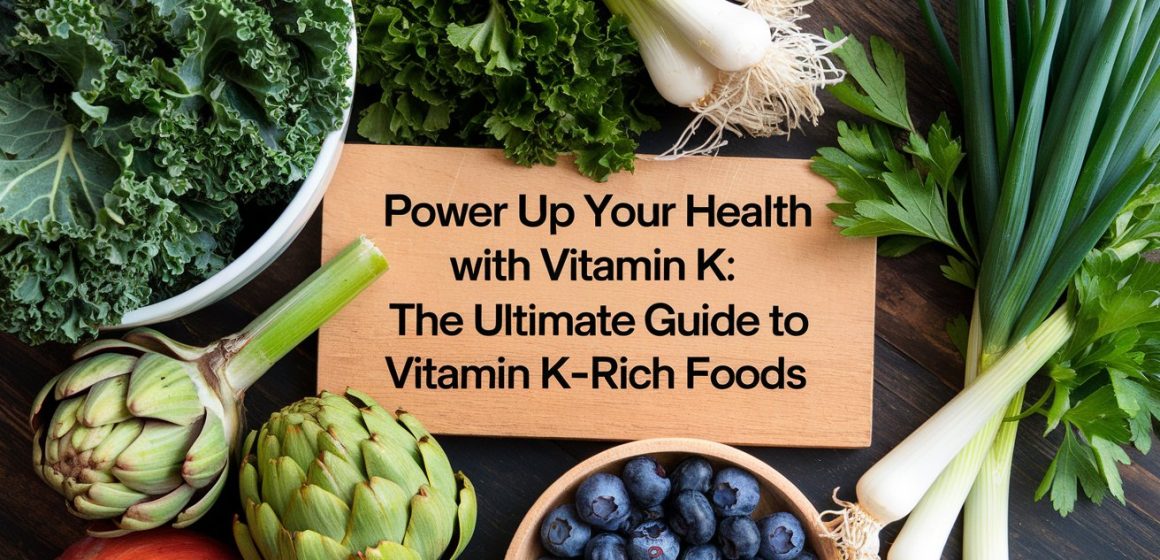Hey there, health enthusiasts! Are you ready to dive into the world of Vitamin K? This super nutrient might not get as much hype as Vitamin C or D, but trust me—Vitamin K is a silent hero when it comes to keeping your body in tip-top shape. From strong bones to a healthy heart, Vitamin K has got your back. So, let’s take a fun tour through the top foods that are bursting with this essential vitamin!
1. Kale: The King of Greens
Let’s kick things off with the reigning champ of Vitamin K—kale! This leafy green superstar isn’t just a trend; it’s a nutritional powerhouse. Just one cup of chopped kale packs a jaw-dropping 817 micrograms of Vitamin K. That’s more than six times the amount you need in a day! Whether you toss it in a smoothie, massage it into a salad with lemon and olive oil, or bake it into crispy chips with a sprinkle of sea salt, kale is a versatile way to load up on your greens and your K. And don’t forget about the different varieties of kale like curly kale, lacinato kale (also known as dinosaur kale), and Redbor kale – each with its unique flavor profile.
2. Spinach: Kale’s Best Buddy
Right alongside kale in the Vitamin K Hall of Fame is spinach. With 483 micrograms of Vitamin K per 100 grams (approximately 3.5 cups raw), spinach is like the best friend who always has your back. It’s super easy to add to your diet—think fresh salads with strawberries and feta cheese, green smoothies with banana and almond milk, or a quick sauté with garlic and olive oil served as a delicious side dish. Plus, it’s packed with iron and other goodies that keep you energized and strong. Popeye knew what he was doing!
3. Broccoli: The Crunchy Nutrient Powerhouse
Next on our list is the humble broccoli. This crunchy veggie might not wear a cape, but it’s definitely a superhero when it comes to nutrition. Broccoli delivers 141 micrograms of Vitamin K per 100 grams (about half a cup cooked), along with a hefty dose of fiber and Vitamin C. Whether you steam it and serve it with a squeeze of lemon juice, roast it with other root vegetables like carrots and potatoes, or toss it into a stir-fry with your favorite protein and a flavorful sauce, broccoli is a delicious way to boost your Vitamin K intake and keep your immune system happy.
4. Brussels Sprouts: Tiny Cabbages, Big Benefits
Don’t let their small size fool you—Brussels sprouts are a big deal in the Vitamin K world! These mini cabbages bring 177 micrograms of Vitamin K per 100 grams (about 7-8 sprouts) to the table. They’re also rich in antioxidants and other nutrients like Vitamin C and fiber that support bone health and reduce inflammation. Roast them with a little olive oil and garlic, or shred them raw for a tasty addition to salads. For a more adventurous take, try pan-frying them with bacon and balsamic vinegar – a delicious and nutritious side dish that will have you coming back for more!
5. Natto: The Fermented Superstar
Now, let’s take a trip to Japan for a taste of natto, a unique food that’s off the charts in Vitamin K2, specifically the MK-7 form which is highly bioavailable. With a whopping 1103 micrograms per 100 grams, natto is like the secret weapon for bone and heart health. It’s made from fermented soybeans and has a distinct flavor and texture that might take some getting used to. Some describe it as pungent and cheesy, while others find it nutty and earthy. But if you’re feeling adventurous, natto is worth a try for its amazing health benefits. Try pairing it with rice, adding it to soups, or incorporating it into sauces for a subtle nutritional boost.
6. Parsley: The Tiny Herb with a Big Punch
Looking for a quick Vitamin K boost? Sprinkle on some parsley! This little herb is more than just a garnish—it’s a Vitamin K powerhouse, offering 1640 micrograms per 100 grams. That’s right, just a handful of parsley can give you a major health kick. Add it to salads, soups, or pretty much any dish for a fresh burst of flavor and nutrients. Parsley is also a good source of Vitamins A and C, making it a triple threat in the nutrition department.
7. Cheese and Eggs: A Little Goes a Long Way
For those who love dairy, certain cheeses like Gouda and Brie are good sources of Vitamin K2, with around 76-86 micrograms per 100 grams. Enjoy them as part of a cheese board, in sandwiches, or melted over your favorite dishes. And let’s not forget egg yolks—they may not have as much Vitamin K as leafy greens, but they still contribute a bit to your daily intake, with about 37 micrograms per 100 grams. Plus, eggs are super versatile, so you can easily include them in your meals for a small, steady boost of Vitamin K2. Think scrambled eggs for breakfast, a frittata for lunch, or a veggie-packed omelet for dinner.
8. Prunes: Sweet and Nutritious
Last but not least, let’s give a shoutout to prunes! These sweet dried fruits offer about 60 micrograms of Vitamin K per 100 grams. Not only are they a good source of this vital nutrient, but they’re also great for digestive health thanks to their fiber content. Snack on them, toss them in your cereal, or add them to baked goods like muffins and cakes for a sweet and nutritious treat. Prunes also pair well with savory dishes, adding a touch of sweetness and depth of flavor.
How Much Vitamin K Do You Really Need?
So, how much Vitamin K should you be aiming for each day? Here’s the lowdown according to the National Institutes of Health:
- Adult Men: 120 micrograms/day
- Adult Women: 90 micrograms/day
- Pregnant/Breastfeeding Women: 90 micrograms/day
- Children and Adolescents:
- 1-3 years: 30 micrograms/day
- 4-8 years: 55 micrograms/day
- 9-13 years: 60 micrograms/day
- 14-18 years: 75 micrograms/day
Keeping It Colorful and K-Rich
Incorporating Vitamin K into your diet is as easy as adding a splash of color to your plate. From the deep greens of kale and spinach to the bright, fresh flavor of parsley, there are so many delicious ways to make sure you’re getting enough of this essential nutrient. And don’t forget the fermented favorites like natto and those creamy cheeses that bring a little extra K2 to your meals.
Remember, a balanced and varied diet is key to getting all the nutrients your body needs. If you have any concerns about your Vitamin K intake or any other nutritional needs, be sure to talk to your doctor or a registered dietitian. They can provide personalized advice and help you create a diet plan that’s right for you.
So, go ahead—experiment with these foods, mix and match, and find your favorite ways to stay healthy and vibrant with Vitamin K. Your bones, heart, and overall health will thank you!

